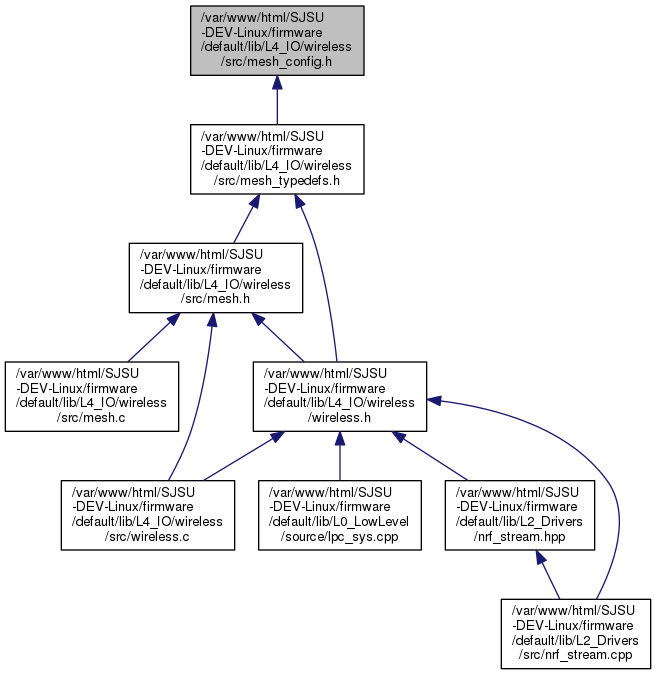Mesh configuration file. More...

Go to the source code of this file.
Macros | |
| #define | MESH_VERSION 3 |
| #define | MESH_PAYLOAD 32 |
| #define | MESH_MAX_NODES 4 |
| #define | MESH_MAX_PEND_PKTS 2 |
| #define | MESH_USE_STATISTICS 1 |
| #define | MESH_INCLUDE_TESTS 0 |
| #define | MESH_ACK_TIMEOUT_MS 8 |
| Packet is retried if an ACK is not received within this time. More... | |
| #define | MESH_PKT_DISC_TIMEOUT_MS 4 |
| Destined node is given this time before we send repeat the packet. More... | |
| #define | MESH_RTE_DISCOVERY_HOPS 3 |
| Number of hops to use when a routed packet fails. More... | |
| #define | MESH_BROADCAST_ADDR 0xFF |
| #define | MESH_ZERO_ADDR 0x00 |
Detailed Description
Mesh configuration file.
Macro Definition Documentation
| #define MESH_ACK_TIMEOUT_MS 8 |
Packet is retried if an ACK is not received within this time.
Mesh packet timeout and route configuration.
MESH_ACK_TIMEOUT_MS : Number of milliseconds of timeout for retry packet and packet repeat. If response time is set to 5, and a node is 2 hops away, we wait 10ms for the ACK from that node. This should be a little more than the maximum time you expect to send a packet, and receive an ACK back.
For example, if it takes 500uS to send a packet, then this should be set to maybe 2ms since it will also take another 500uS to get the ACK back.
MESH_PKT_DISC_TIMEOUT_MS The packet discovery timeout should be roughly half of the ACK timeout. This is only used when discovering a new route. So this is a "hold off" time for intermediate node(s) to wait for destination to respond before they repeat the packet hoping it will go to its final destination.
MESH_RTE_DISCOVERY_HOPS When a route is discovered, it is saved for future use. When a packet to this known route fails, the packet needs to discover a new route, and we use this many hops to find its new route. If route still fails, then the user should manually send a new packet with higher max-hop-count
| #define MESH_BROADCAST_ADDR 0xFF |
Special mesh addresses - Do not change these.
| #define MESH_INCLUDE_TESTS 0 |
Optionally, define the debug print method. If this is set to non-zero, then the mesh.c will include unit tests with the entry point being mesh_test();
| #define MESH_MAX_NODES 4 |
Defines the number of buffers we use for various purposes :
- Routing table consisting of destination, and source address (4 bytes each)
- Previous packets to avoid duplicate transmission (3 bytes each)
- Mesh packets used to retransmit a lost packet (payload + 4 bytes each)
The formula for the RAM requirement is : (4 * N) + (3 * N) + N*(PL + 4) + M*(PL + 4) where N = MESH_MAX_NODES and M = MESH_MAX_PEND_PKTS
This should be ideally the max nodes this node can communicate with. If there are too many neighboring nodes, such as 20, a lower number like 10 can be used, however, it will decrease efficiency of the mesh network as routes may need to be rediscovered as they may be over-written. Furthermore, the node may drop packets that it may be responsible to repeat.
| #define MESH_MAX_PEND_PKTS 2 |
This defines dedicated buffer size of OUR packets sent to others by mesh_send(). The pending packets' buffer is used for retry logic until an ACK has been received.
You may send more packets than this number, but then you will compromise the packet delivery (reliability) because some packets that need to be retried may be erased.
Minimum should be 2, one for outgoing packet, and one for an ACK packet.
| #define MESH_PAYLOAD 32 |
The payload that your radio driver can carry. Part of the payload consists of the mesh transport header (8 bytes as of version 2).
| #define MESH_PKT_DISC_TIMEOUT_MS 4 |
Destined node is given this time before we send repeat the packet.
| #define MESH_RTE_DISCOVERY_HOPS 3 |
Number of hops to use when a routed packet fails.
| #define MESH_USE_STATISTICS 1 |
Keep statistical counters and enable mesh_get_stats() method. An ACK_RSP packet contains statistical data of another node at the expense of using a few more bytes of RAM.
- See also
- mesh_stats_t
- mesh_get_stats()
| #define MESH_VERSION 3 |
Each payload header contains mesh version to detect version mismatch.
Version info : 3c - No change. Changed all "m_" to "g_" (coding standard) 3b - No change to algorithm; added more methods:
- mesh_is_ack_ok()
- mesh_get_expected_ack_time()
- mesh_get_max_timeout_before_packet_fails() 3- - Previous version should've been 3, so fixed this documentation error here. 2b- - Each route now has a score, the route will lowest score is removed first.
If a packet comes in with unknown route, a NULL packet is sent back such that source node will know the route for next packet. 2- - Added an implicit ping packet with each node having a description.
- Fixed bug at mesh_deform_pkt()
- Check for failure of app_recv() callback.
- Macro of hop-count to use when a routed packet fails and a new route needs to be discovered. 1d- Fixed a bug at mesh_handle_mesh_packet() 1c- - Changed mesh_service() to not take the system time value. Instead, mesh network will obtain the time when needed from the newly added timer driver function.
- Mesh network discovery packets are now queued and are only sent if the destined node is not heard until MESH_PKT_DISC_TIMEOUT_MS
- Major bugfix since size of m_our_pnd_pkts_size was out of bounds. 1b- Add mesh_form_packet() and mesh_send_formed_packet() 1a- Minor update to add mesh_error_mask_t 1 - Initial version
| #define MESH_ZERO_ADDR 0x00 |


 1.8.11
1.8.11